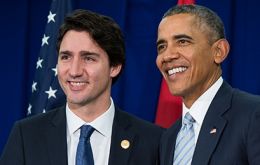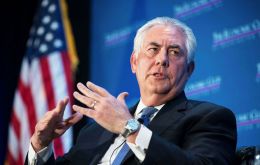MercoPress. South Atlantic News Agency
Energy & Oil
-
Wednesday, December 28th 2016 - 04:00 UTC
Iran wants stronger maritime capabilities, including an aircraft carrier

Iran's Deputy Navy Commander for Coordination, Admiral Peiman Jafari Tehrani, admitted his country needs better military equipment, including but not limited to the bulding of a new aircraft carrier, as cited by semi-official Fars news agency. Iran's fleet regularly escorts from the threat of modern age pirates ships, particularly oil tankers, from the Persian Gulf all the way down to South Africa and the Atlantic Ocean.
-
Tuesday, December 27th 2016 - 09:17 UTC
Petrobras plans to claim part of Odebrecht's payments deal in US and Switzerland
![“We’re looking for ways to reimburse shareholders and the [Brazilian] government,” said Petrobras’s governance director João Elek](/data/cache/noticias/57902/260x165/joaoelek.jpg)
Brazilian oil company Petrobras plans to request part of the record anticorruption settlement that construction company Odebrecht SA signed earlier this week with Brazilian, U.S. and Swiss authorities. Petrobras has said it was the victim of the vast bid-rigging and kickbacks scheme that Odebrecht admitted to helping run.
-
Friday, December 23rd 2016 - 05:42 UTC
China ready to work with Argentina as Supreme Court halts constructions of two dams
China is ready to to join forces with Argentina after the construction of two hydroelectric dams in the province of Santa Cruz was put on hold by the Supreme Court over environmental concerns, a spokesperson for the Chinese Foreign Ministry said.
-
Friday, December 23rd 2016 - 00:39 UTC
Falklands' Sea Lion oil field development “break-even price is US$ 45/bbl”

Rockhopper Exploration has issued an update on planning for Phase 1 of the Sea Lion oil field development in the offshore North Falkland basin. Operator Premier's latest estimate of capex to first oil is US$1.5 billion, with life of field costs (capex, opex, and lease) of around US$35/bbl for Phase 1.
-
Friday, December 23rd 2016 - 00:25 UTC
Greek present for Trump: Obama and Trudeau ban offshore oil and gas drilling in Atlantic and Arctic waters

In the final stretch of his term President Barack Obama is implementing new environmental protections that stand to thwart Donald Trump's agenda on oil and gas extraction in ways that may prove difficult for the president-elect to roll back. The Obama administration announced on Tuesday that it will place an indefinite ban on offshore oil and gas drilling across large swaths of Atlantic and Arctic waters.
-
Wednesday, December 21st 2016 - 01:12 UTC
Falklands' additional air link to South America has a target launch date: October 2017

Argentina, United Kingdom and Falkland Islands representatives have agreed on a process for an additional air service to the Falklands, from either Brazil or Chile, with a target launch date of October 2017, and likewise will address scientific data exchange in relation to fish stocks in the South Atlantic, particularly regarding the migratory Illex stock.
-
Saturday, December 17th 2016 - 00:24 UTC
Petrobras sells ethanol assets as it moves out of the biofuels industry

Brazil's oil company Petrobras has agreed to sell its 49% stake in the sugar and ethanol joint venture Nova Fronteira Bioenergia SA to partner São Martinho SA, both companies said in securities filings on Thursday. Petrobras will receive 24 million new São Martinho shares as payment for the stake. Petrobras said in the filing that it will attribute a US$133 million value to the deal.
-
Wednesday, December 14th 2016 - 05:10 UTC
Trump challenges Congress and nominates close friend of Putin, Rex Tillerson Secretary of State

Donald Trump officially announced his plan Tuesday to nominate ExxonMobil CEO Rex Tillerson as secretary of state, a pick that could pose complications in the confirmation process due to Tillerson's ties to Russia. Tillerson, 64, has no government or diplomatic experience but has done extensive work overseas on behalf of his petroleum company.
-
Sunday, December 11th 2016 - 21:13 UTC
Petrobras ordered to temporarily suspend divestiture program; court wants to review asset sales

Brazil's federal auditing court (TCU) asked state-controlled oil company Petrobras to temporarily suspend its divestiture program while the court reviews asset sales procedures. The decision could delay Petrobras efforts to raise US$15.1 billion from asset sales by the end of 2016 as a way to reduce its huge debt -- the largest in the global oil industry.
-
Thursday, December 8th 2016 - 19:01 UTC
Russia sells 19.5% of Rosneft - ‘biggest privatization deal of 2016,’ says Putin

Russian President Vladimir Putin labeled the sale of 19.5% of state-owned oil giant Rosneft's shares to the natural resource trader Glencore International and a Qatari sovereign wealth fund for over $11 billion was “the biggest sale and acquisition in the world’s oil and gas sector in 2016,” the official Kremlin website reported Wednesday.
